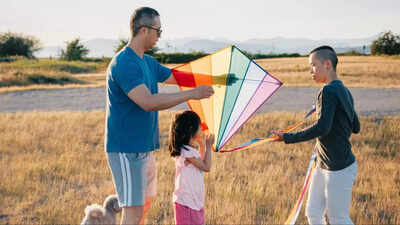ARTICLE AD BOX

Transforming family evenings: 7 tips to combat screen overuse for healthier kids (Image: Pexels)
Across Indian households, evenings once set aside for conversation, board games or storytelling are now frequently overtaken by screens. It is a clear sign of what experts might call an “on life” family routine, where the boundary between being online and offline has all but disappeared.
According to a study by the Psychology Department at Saurashtra University, more than 81% of children under ten now rely on screens, mostly cartoons, while eating, as parents use them to keep mealtimes manageable. This habit not only interrupts the natural sensory experience of food but also takes away valuable moments for language development and family conversations.Most families treat evenings like the pit stop in a race - rush through homework, dinner and chores before collapsing into bed.
What if evenings weren’t just about winding down but about recharging together? Redesigning evenings does not require big plans or expensive outings. It starts with a simple shift: swapping “routine” with “ritual.” A routine is brushing teeth. A ritual is everyone brushing, then sharing the funniest thing that happened that day.
Same task, different energy.In an interview with TOI, Dr. Aditi Sapovadia, Paediatric Ophthalmologist, Squint and Cataract Consultant at Netradeep Maxivision Eye Hospital in Rajkot, shared, "Children as young as five are now being diagnosed with myopia, and the primary driver is lifestyle rather than heredity.
Prolonged hours of near-focus on screens, reduced exposure to natural daylight, and poor visual hygiene are accelerating eye strain and structural changes in developing eyes at an alarming pace.
Continuous near work and limited outdoor light exposure are altering the normal growth of children’s eyes, leading to earlier onset of myopia. If balance is not restored, we risk a generation developing advanced vision disorders far sooner than expected."
The hidden cost of digital evenings
As per a report published in Cureus in June 2025, India’s children now spend an average 2.2 hours daily on recreational screens, most of it during evening hours. Studies reveal that excessive screen use delays sleep onset, disrupts circadian rhythms and increases irritability but the most pressing concern is its link with childhood myopia.
Why screens strain young eyes
Children’s eyes are still developing and are not designed for prolonged near-focus on glowing screens.
Research suggests that every extra hour of recreational screen time raises the risk of myopia significantly. This digital overuse is compounded by the loss of outdoor play artificial lighting replaces natural sunlight, robbing children of an essential biological safeguard. Early signs like squinting, headaches, or sitting too close to the TV often go unnoticed until the condition progresses.

Outdoor activities help reduce the digital strain on eyes (Image: Pexels)
A 2024 study in Journal of Functional Morphology and Kinesiology (JFMK), found that prolonged digital device use is linked to decreased physical activity and increased adiposity.
High screen exposure contributes to sleep disturbances, behavioural problems and reduced academic performance while children with heavy screen use also exhibited ocular (eye) conditions and Covid-19 lockdowns exacerbated these issues through extended e-learning periods.
Setting boundaries that work
Experts recommend at least 90 to 120 minutes of outdoor activity every day. Alongside this, Dr. Sapovadia recommended -
- Entertainment-based screen use should be limited to one to two hours.
- Indoors, adopting the simple 20-20-20 rule of looking 20 feet away for 20 seconds every 20 minutes can reduce strain.
- Parents may also set screen-free areas such as bedrooms or dinner tables to create healthier evenings.
- Protecting children's vision does not need expensive answers. Redesigning evenings in the family to get children outside and scrolling less and by transforming the after-school hours into an after-school time of walking, talking, or playing, families not only save vision but also rediscover meaningful relationships. What seems like a small trade-off now may save clear sight and fond memories for a lifetime.

Parents should redesigning evenings to get their child outside and scroll less not only to save vision but also to strengthen their bond.
Bringing her expertise to the same, Dr. Mansi Talwar, Mindful Leadership Coach at Communication Mentor, suggested -
- Think of evenings as a blank canvas: One night, turn dinner into a theme; “taco Tuesday” or “breakfast for dinner”. Another night, try a “tech blackout” for 30 minutes and watch how quickly board games or dumb charades make a comeback.
- Make meditation fun: If the kids groan at “meditation”, rebrand it as a “cloud game”; close your eyes, imagine your day’s worries on clouds and let them float away. Playful but still calming.
- Create micro-moments: The point is not to squeeze in more “quality time” (which often feels like another to-do list item). It is to create micro-moments that feel light, not forced. Even a five-minute dance in the kitchen while loading the dishwasher can shift the family mood from stressed to connected.
Balance does not need extreme solutions just redefining evenings by adding outdoor play, shared experience and conscious screen limits can save eye health and tighten relationships.
By making conscious decisions now, families can create a healthier, happier and clearer-sighted future for generations to come.The secret is, children don’t remember the perfectly managed schedules; they remember the laughter in between. So, instead of ending the day drained, design evenings as a little playground for your family because fun isn’t what happens after the day is done, it’s what makes the day worth remembering.



.png)
.png)
.png)
















 6 hours ago
4
6 hours ago
4








 English (US) ·
English (US) ·